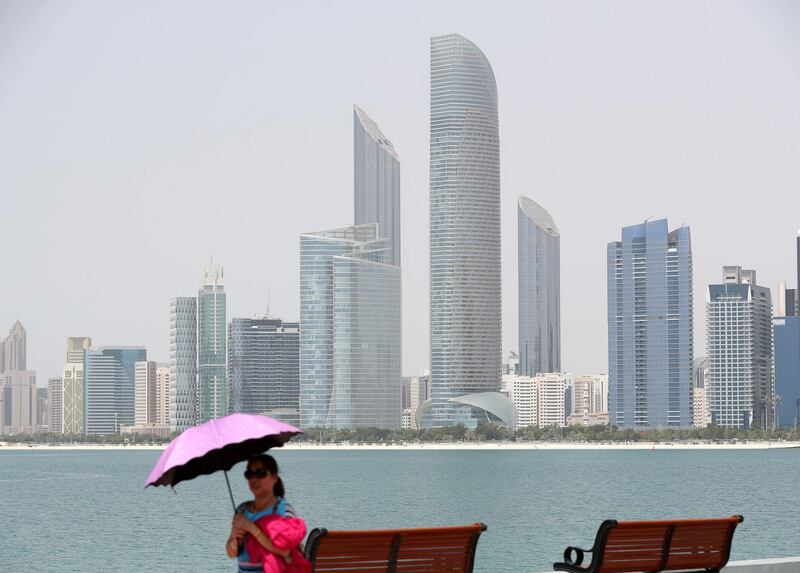Abu Dhabi's overall gross domestic product (GDP) surged 17.3 per cent reaching Dh236 billion at current prices for the third quarter of 2018, as the three-year recovery in oil prices, a pick-up of the non-oil economy as well as economic reforms bolstered growth, according to figures from the Statistics Centre Abu Dhabi (SCAD).
Oil GDP for the third quarter surged 46.3 per cent to reach Dh98.2bn compared with Dh67.1bn for the same period last year. Its contribution to the overall economy stood at 41.5 per cent, according to SCAD.
Non-oil GDP for Abu Dhabi increased by 2.9 per cent in the third quarter to reach Dh138.4bn, compared with Dh134.5bn for the same period last year. The contribution of the non-oil economy to overall GDP was 58.5 per cent for the quarter.
Non-oil activities and sectors had achieved "positive growth rates of varying proportions" with the emirate making "great leaps in diversifying its economic base and income sources," said SCAD chairman Rashed Lahej Al Mansoori.
He added that non-oil sectors of Abu Dhabi's economy outpaced the oil sector, accounting for 65.9 per cent of GDP at current prices in 2017, which he said was a result of the emirate aiming for a sustainable economic development model with an increased thrust on diversification away from energy revenues alone.
Abu Dhabi accounts for around 4.2 per cent of the world's oil production. Oil prices rallied to three-year highs, averaging around $70 per barrel for Brent for the first three quarters of 2018, hitting $86.29 in October before falling to 30 per cent of its value the following month. Oil's rally had lifted investment outlook for oil-revenue dependent economies in the Middle East such as Abu Dhabi and allowed for greater inflows of investment in upstream and downstream sectors of the emirate's energy sector. The International Monetary Fund had earlier indicated that the UAE's real GDP would grow 3.7 per cent in 2019 compared with 2.9 per cent forecast for last year as momentum in the non-oil economy signalled a positive outlook for this year.
_______________
Read more:
Sheikh Mohammed bin Zayed announces Dh50 billion stimulus for Abu Dhabi
The UAE explained: What are the new plans for the economy and why?
_______________
According to SCAD, in 2017, a growth rate of 7 per cent with GDP of Dh814bn was registered on the back of higher oil revenues from the pick-up in crude prices, compared with Dh760bn for the previous year.
"Positive developments in the economic situation in Abu Dhabi, [supported] the emirate's level of financial stability," said Rashed Abdul Karim Al Balooshi, undersecretary of Abu Dhabi's Department of Economic Development.
Abu Dhabi announced a Dh50bn stimulus package in June, with a detailed execution plan to transform the ease of doing business for owners, residents and investors. Ten initiatives were announced with the aim of accelerating economic growth over the next three years, including a new work-from-home policy, initiatives to clear slow or non-payments as well as an execution plan to cover infrastructure and legislative projects, small and medium-sized enterprises as well as industrial and social projects.
Meanwhile, for 2017, Abu Dhabi's oil GDP surged 14.9 per cent to Dh277bn, on the back of higher prices while non-oil GDP saw growth at a pace of 3.3 per cent to reach Dh537bn, according to SCAD.
The UAE also moved up 10 places on the World Bank's Ease of Doing Business Ranking to secure the eleventh position globally in 2019, leading the Arab world for the sixth consecutive year.
"The country is fast closing in to become among the top 10 in the Ease of Doing Business ranking of 190 countries by the World Bank," said Juma Mohammad Al Kait, assistant undersecretary for foreign trade affairs at the economy ministry, according to the state-run WAM news agency.






